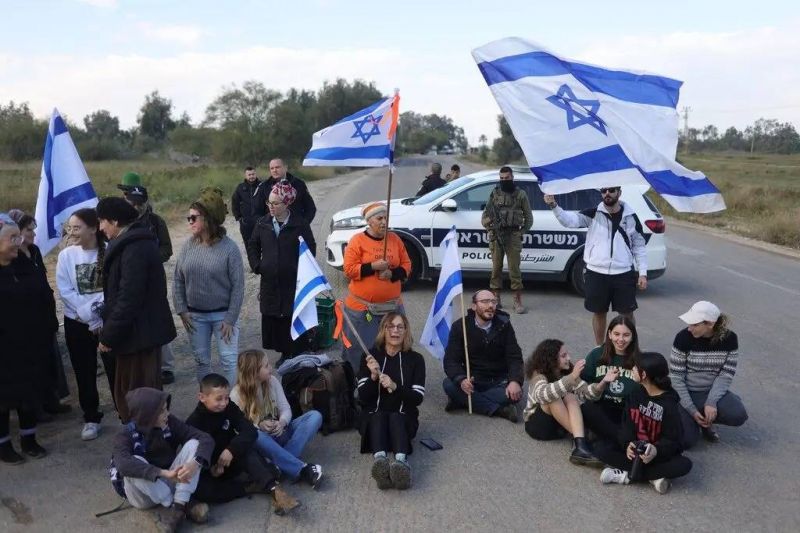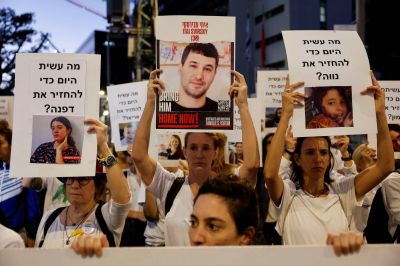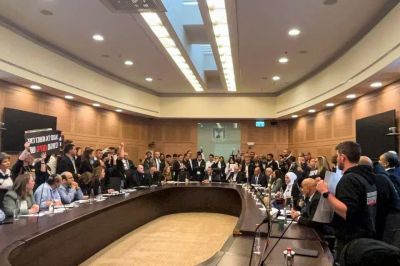
Israeli protesters attempting to block the humanitarian aid from blocking the Kerem Shalom border crossing into Gaza on Monday. (Credit AFP)
BEIRUT — For weeks, pressure has mounted on Israeli Prime Minister Benjamin Netanyahu's government to prioritize the release of the remaining 132 hostages held in Gaza since the Hamas-led Oct. 7 attack. The count includes the bodies of 28 hostages who are believed to have been killed during Israeli bombardment in the Strip, and by Israeli troops who have mistaken them for “Hamas fighters.”
Hamas leader Ismail Haniyeh's visit to Cairo, where he is reviewing the proposal for what several reports describe as a six-week truce and hostage exchange, will be watched closely by the families of those being held captive by the group.
Families block humanitarian aid, storm Knesset
The hostages' families have intensified their methods of protest over the last several weeks. Some have routinely obstructed the entry of humanitarian aid to Palestinians in the Gaza Strip through the Kerem Shalom crossing, to demand the return of the hostages. On Wednesday, dozens of people blocked the crossing for the sixth consecutive day.
The demonstrations were organized by the "Tzav 9" ("Order 9") movement, which includes family members of Israelis held by Hamas in the Gaza Strip.
“We [want to show Israeli] Prime Minister Benjamin Netanyahu that he can stop the trucks, just as we are stopping them now,” said Dany Elgart, a brother of Itzik Elgart, who is being held hostage in Gaza, cited by Israeli news outlet Haaretz.
"I call on all citizens: come to the checkpoint and stop this humanitarian aid with your bodies ... The hostages there do not receive any humanitarian aid,” Eglart said.
On Jan. 18, medicine destined for hostages entered Gaza as part of a deal between Israel and Hamas brokered by Qatar.
Tzofit Libman, the sister-in-law of Eliahu Libman, a 23-year-old hostage, called on the “people of Israel to join the protest. If there are thousands of people standing here protesting, the trucks will not pass,” she said, cited by Haaretz.
She added: “This humanitarian aid is a moral lapse. These innocent civilians [Gaza residents] are helping Hamas, and they chose Hamas. There is no reason for them to receive anything, anything at all, from the Israeli government.”
The humanitarian aid, blocked by the families of the Israeli hostages, comes from abroad and is transported through Israel.
On Jan. 22, about 20 family members of Israelis held hostage in the Gaza Strip stormed a Knesset Finance Committee meeting in Jerusalem, chanting: “Release them now." They demanded that Israel’s government do more to return their loved ones, as fighting in Khan Younis reached unprecedented levels.
One woman, whose three family members were taken by Hamas, cried: “Just one I’d like to get back alive, one out of three.” Other protesters held up signs reading: “You will not sit here while they die there.”
Hostages' safety threatened by Israeli offensive
Some families of the remaining hostages are worried that their relatives’ plight now comes second to Israel’s objective of "destroying Hamas," and appear to be ramping up their approach in pursuit of another hostage exchange deal.
The Israeli Army said last week that three hostages, whose bodies were recovered in the Jabalia area in December, may have been killed by an Israeli "airstrike on a Hamas tunnel," stoking fear among the relatives of remaining hostages.
At least 28 hostages are believed to have died in Gaza, including three men who were shot and killed by Israeli soldiers after escaping captivity and approaching the troops for help. The soldiers alleged that they had mistaken the hostages, who approached with arms raised, for "Hamas fighters."
Weekly Saturday night rallies demanding the release of hostages have been supplemented in recent weeks by growing calls for elections
"The Holocaust is happening to us again," Holocaust survivor Bella Haim said Tuesday. Her grandson Yotam Haim was taken hostage in the Gaza Strip and then accidentally killed by the army, according to Haaretz.
Some families of the hostages have traveled to the US, UK, and even Egypt in an attempt to push for a deal with Hamas that will see their family members released.
L'Orient Today spoke with Imad Salamey, associate professor of Middle Eastern political affairs at the Lebanese American University, who said that the atmosphere in Israel is being affected by calls for the prioritization of the hostages' return.
“Pressure is mounting on Netanyahu to negotiate, driven by the desire to avoid continued bombardment that could risk the lives of hostages. There is a growing anti-war sentiment within Israel, creating an obstacle for the military's objective of dismantling Hamas."
Salamey told L'Orient Today that he sees the families exerting influence on two fronts. For one, he says Israel would not have negotiated with Hamas over a hostage exchange if it were not for the effect the families have. Secondly, the families are giving momentum to an anti-war movement in Israel, "because they don't want continued bombardment to risk killing hostages," he explained.
"Their pressure can put an end to these Israeli military campaigns," Salamey believes, "Creating a serious obstacle for the Israeli military in facing the objective of dismantling Hamas."
In the wake of Operation al-Aqsa Flood on Oct.7, Hamas said that the hostages would be exchanged with thousands of Palestinian prisoners who are unfairly detained by Israel. Then, at the end of November, Hamas released 105 hostages in return for 240 Palestinian women and children held in Israeli prisons, as part of a week-long truce.
This week, Hamas’ top political leader Ismail Haniyeh said the group is studying the latest proposal for a truce but the priority is the “full withdrawal” of Israeli forces from Gaza and a long-term cease-fire. On Tuesday, Netanyahu insisted that Gaza be “governed under Israeli leadership, like the West Bank."
According to Salamey, the issue of governance in Gaza is not as much a priority for Hamas as is seeking a halt in fighting and the release of Palestinian prisoners.
On Tuesday, Netanyahu refuted reports of a possible truce agreement, saying: "We will not withdraw the Israeli military from the Gaza Strip, and we will not release thousands of [Palestinian prisoners,]” he said. He vowed Israel would remain in its war on Gaza until “all goals are achieved.”
Qatar and Egypt, key mediators between the warring parties, have held talks with Israel and the United States in recent days. US officials said negotiators made progress toward a deal, including the phased release of the remaining captives over a two-month period, and the entry of more humanitarian aid into Gaza.
'Significant hurdles'
Salamey told L'Orient Today that the weighing of Israeli hostages versus Palestinian prisoners is a "significant hurdle" in any negotiations between the two sides.
From Hamas's perspective, securing the release of Palestinian prisoners and achieving an extended truce is crucial for a perceived victory. Hamas is in a challenging position, leaning toward prioritizing a truce over a prisoner exchange, and the longer the truce, the better.
On the other hand, Israel also wishes to appear victorious. "The release of Israeli hostages is considered a key element of success," Salamey says, "However the cost of releasing Palestinian prisoners is perceived as high, and Israel is reluctant to acknowledge Hamas as a negotiating partner on equal terms.”
Salamey noted that although Israel has inflicted damage to Hamas infrastructure, it still needs more time to dismantle the group completely, time which it does not have as families of the hostages continue to pressure the government, Knesset, and war Cabinet.

